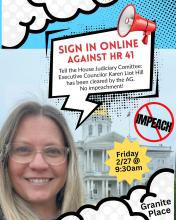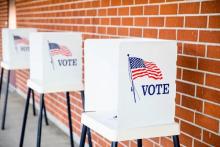Earlier this week, due to constant peaceful protests, media and social media publicity along with contacting the governor and federal representatives, the proposed human warehouse in Merrimack was declared “dead on arrival.” Too bad for House Majority Leader Jason Osborne, who was so looking forward to a “ribbon cutting.”

Ahhh, the power of We, the People, when we band together and use our voices.
Now the end of this week brought the abrupt end of another cruel and vengeful piece of proposed legislation filed by Free Stater Deputy Majority Leader Joe Sweeney. HR 41 was seeking to have the House of Representatives investigate whether grounds existed to impeach Executive Councilor Karen Liot Hill, the only Democrat on the Executive Council.
Her “crime”? Let’s recap that . . .
Sweeney, the lone sponsor, claimed in his bill, “in her capacity as an executive councilor, Karen Liot Hill used official resources, including her government email account and the prestige and authority of her office, to facilitate and encourage litigation against the state of New Hampshire’s duly enacted election laws by recruiting potential plaintiffs and referring them to a partisan out-of-state law firm . . .”
In mid-December, the state’s Attorney General’s Office found otherwise, announcing Executive Councilor Karen Liot Hill did nothing wrong by using her government email responding to a law firm suing the state over our new suppressive voter ID law. But HR 41 was already filed and in the process of making its way to the House floor for a vote. Before that happens, the bill went to the House Judiciary Committee, where there was a public hearing held Fri., Feb. 27th.
The committee room was packed, with more than 50 people who showed up in support of Karen. More people had previously gone online to register their support for her, 2,031 to be exact. Perhaps that was why Sweeney had withdrawn his support for his own bill, as we all learned at the start of the hearing and was a no show. . .
At the end of what turned out to be a very short hearing, the Judiciary Committee unanimously voted to send this nonsense to the full House with a recommendation of ITL (Inexpedient to Legislate), “kill the bill.” More here.
Let’s continue to use our voices.
HB 1277 is a reasonable bi-partisan bill seeking to “require an applicant for an absentee ballot to write his or her drivers' license number or nondrivers' license identification number on their application.” Online support numbered 306 to 10 who opposed. This committee is meeting on Tues. the 3rd and you can urge members of the Election Law Committee to vote Ought to Pass (OTP) by contacting (email) them.
On Thurs. the 5th, the State Senate will be voting on HB 323, another suppressive voting bill, this time targeting college students. This bill requires presenting a government-issued photographic means of identification to vote, rather than the acceptance of a college ID. Which seemed to work OK in the past. File this one under, “it ain’t broke, why are you trying to fix it?” Contact your senator (or drop all of them an email) urging them to vote against this bill. Those who registered their opposition online numbered 811 to 67 who supported it.
In yesterday’s words of Executive Councilor Karen Liot Hill, “. . . we have two-year terms for members of the executive and legislative branch, and the voters are the ones who hold their elected officials accountable."
Just sayin’ . . . and thank you all for your determined activism in the name of democracy.










